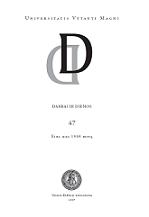Totalitarizmas ir sovietmečio meno (ne)laisvė. Kai kurie vertinimo klausimai
Totalitarianism and the (non)freedom of art during the soviet period: reflexions on the problem of evaluative criteria
Author(s): Skaidra TrilupaitytėSubject(s): History
Published by: Vytauto Didžiojo Universitetas
Keywords: Totalitarianism; freedom; art; soviet; period; reflexions; problem; evaluative; criteria;
Summary/Abstract: This article highlights the inconsistencies encountered in esthetic and political evalations of art deemed universal. It also draws attention to the fact that in post-soviet cultural history accounts of the „absolute lack of cultural freedom" as well as the notion of the „silent opposition of the artist" have often been determined by the author's, or speaker's, rhetorical relationship to a totalitarian past. Even if one consistently (at least on the rhetorical level) recognises the complexity of the realities of art production during the late soviet period, this reality continues to be evaluated from normative perspectives. For this reason prior political convictions, which necessarily imply moral criteria, are still very much alive in accounts of the administrative aspects of art as well as in narratives of anti-soviet cultural resistance. In analyzing the complexities of ethical and esthetic evaluations of soviet art, this article considers first the characteristics of both the Western and the Soviet view of totalitarianism and points to the links between cold war rhetoric and the thinking of the dissident community of Lithuanian exiles. Then we analyse the connotations of the concept of totalitarianism in the field of the visual arts, drawing attention to the moral, local dilemmas that arose in post-Soviet Lithuania as it attempted to evaluate art objects of the not yet distant past. Finally, we discuss certain attitudes in post-soviet art criticism. It is clear today that opinions about art of the soviet era were first and foremost influenced not by empirical research but by essayistic and philosophical considerations; however, to a degree one can discern divergencies between discourses prevalent in the various disciplines (cultural history as opposed to art criticism, for instance). Psychological circumstances can also explain the fact that even as socialism collapsed, and parallelly with the „discovery" of the concept of totalitarianism, a kind of „reverse" discourse of dissidence came into being; it sought to clarify the fundamental opposition of „true" art to the communist system.
Journal: Darbai ir dienos
- Issue Year: 2007
- Issue No: 47
- Page Range: 93-114
- Page Count: 22
- Language: Lithuanian

